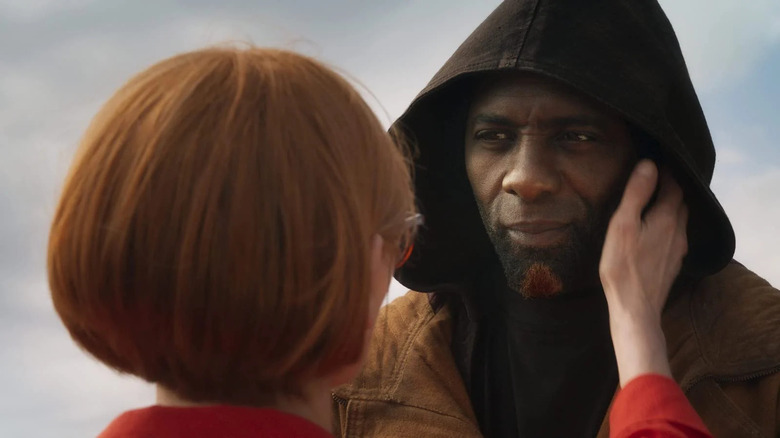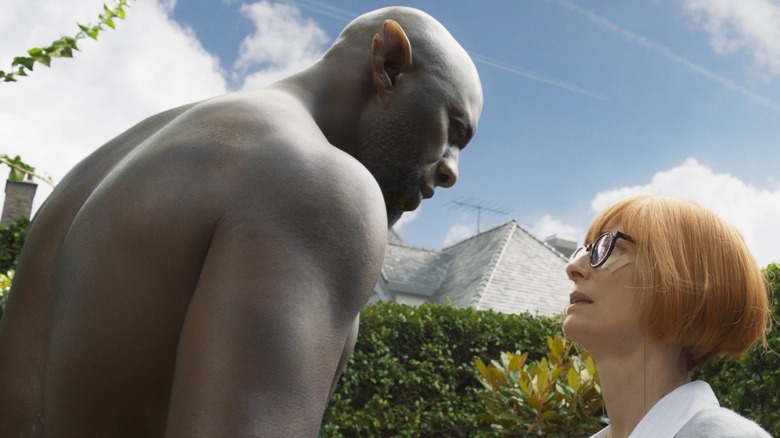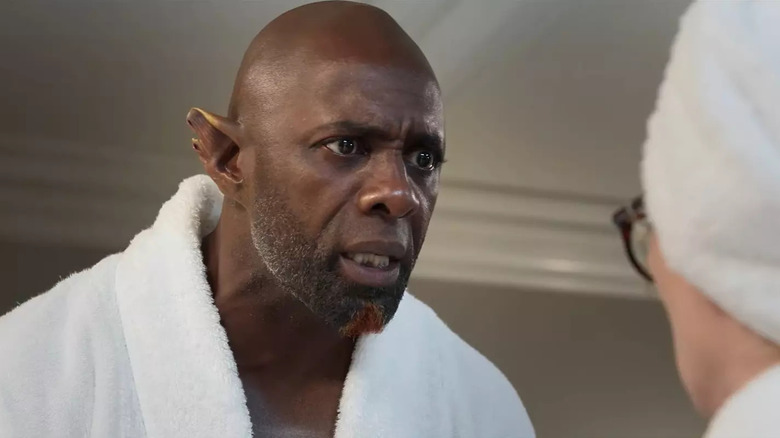How Idris Elba Made George Miller Rethink How To Shoot Three Thousand Years Of Longing [Exclusive]
Based on the 1994 A.S. Byatt short story "The Djinn in the Nightingale's Eye," George Miller's new film "Three Thousand Years of Longing" — in theaters on August 26 in the United States — stars Idris Elba as Byatt's titular djinn who appears to a human scholar named Alithea (Tilda Swinton) to grant her wishes in exchange for his freedom. "The Djinn in the Nightingale's Eye" appeared in a collection of similar short stories that draw heavily from ancient texts and folk tales, linking up themes and characters from works such as the "Epic of Gilgamesh," "One Thousand and One Nights," and "The Canterbury Tales," as well as the works of William Shakespeare, and the myth of Cybele. Miller seemingly matched Byatt's thematic links by including multiple flashback scenes wherein the djinn interacts with figures of the distant past.
The central narrative of Miller's film takes place in a single hotel room in Istanbul, and the bulk of the present-day action is a mere conversation between a highly educated human and an antediluvian magical being.
In a /Film interview, Miller, talking to Emma Stefansky, discussed shooting "Three Thousand Years of Longing" and how Elba, enthused to be a part of the project from the start, made a simple request that Miller hadn't considered. Elba wanted the scenes in the ancient past to be filmed prior to the scenes in the modern day.
The ancient world
In "Three Thousand Years of Longing," the djinn has scenes with the Queen of Sheba, a figure from the Hebrew Bible and also from the Qurʾān, who once visited King Solomon to witness his wisdom in person. The Queen is played by Aamito Lagum. The djinn will also be seen visiting the Ottoman Empire, with Prince Mustafa being played by Matteo Bocelli. In knowing that his character would be popping up throughout history, Elba had a very simple idea as to how he felt the movie should be filmed: chronologically.
"Idris blew me away. The first conversation we had, the first sentence was, 'Look, I'd really like to do this film.' And the second sentence was, 'Can we shoot all the stories he tells Alithea before we shoot the scenes in the hotel room?' Until he said that, despite having worked on the film for so long, it just didn't occur to me to do that. So he's thinking as the filmmaker as well as the actor."
Elba, it should be noted, directed a 2018 British crime drama called "Yardie" based on the 1992 novel by Victor Headley and starring Aml Ameen. Elba may not be as experienced a filmmaker as Miller — a man with 13 credited features to him name — but Miller was impressed with Elba's wherewithal. Miller even admitted that Elba's approach made for a better film, saying:
"It proved to be by far the best strategy to shoot the film. So we shot all these scenes with the other characters — Sheba, the Ottoman scenes, all the way through before Tilda arrived — and then we finally shot the conversation in the hotel room. Small things like that, which are so self-evident, they contributed so much more."
My Djinn-er with Andre
In the same interview, Miller compared "Three Thousand Years of Longing" to the vital 1981 Louis Malle film "My Dinner with Andre," a film notorious for its simple setup. Two men (Wallace Shawn and Andre Gregory) meet in a high scale New York restaurant for dinner and conversation. The two men hadn't seen each other in a long while, and they spend their time catching up. They also learn that each one looks at the other's worldview with a little suspicion. Gregory proclaims Shawn's clinging to creature comforts is antithetical to art and growth. Shawn points out that Gregory's galavanting robs one of the deep appreciation of life's simplest, truest pleasures. One is grounded, the other is intellectual.
According to Miller, "Three Thousand Years of Longing" is similar to "Dinner" in its conversational angle. Only now, the intellect is the grounded one — the figure of logic and reason — while the highfalutin world traveler is a supernatural entity. The mind and the spirit. The Apollonian and the Dionysian.
Elba's suggestion that the film be shot more or less chronologically not only aided the conversational narrative, giving his character a backstory, but likely also aided him as an actor. If the djinn is going to tell stories to a modern day human, it would help if the actor had experience with those scenes in order to have images to draw from. Smart for the actor. Smart for the director.


